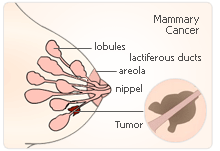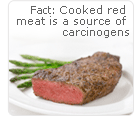Many studies have been done on women's risks for breast cancer (due in part to the progesterone hormone) and their diet. However, the 2006 study by Eunyoung Cho et al.: “Red Meat Intake and Risk of Breast Cancer Among Premenopausal Women” explores this link from the perspective of women of premenopause status. It evaluates the risk that women of premenopause status have for a progesterone hormone imbalance and, therefore, breast cancer through their consumption of red meat poses. The progesterone hormone can stimulate cancerous cell growth by turning on the hormone receptors in cancer cells.

It is important that the origins of premenopause and postmenopause breast cancer be studied differently. The danger of breast cancer from the progesterone hormone for premenopause women could be different than the risk for women who have passed premenopause. Many risk factors, such as reproductive status and ionizing radiation, take place during premenopause. It has been speculated that the years before the birth of one's first child may be the most relevant for the danger of breast cancer, which is why it is important that the diet throughout premenopause be investigated.

The link between intake of red meat and breast cancer is not clearly defined, but obviously present. Processed red mean is a source of carcinogens, which travel through hormonal pathways. However, few studies of diet have made it a point to distinguish between the different kinds of breast cancer and the role that hormones such as the progesterone hormone play. The principal difference between different kinds of breast cancer is that some have positive progesterone red meat receptors to the progesterone hormone and estrogen while some do not have positive receptors to the progesterone hormone and estrogen. The study assessed the impact that diet during premenopause had on both of these types of cancers. The more red meat that one ate during premenopause, the higher the risk for breast cancer that is receptor positive to the progesterone hormone and estrogen. However, consumption of red meat during premenopause had no impact on cancers that were not receptor positive to the progesterone hormone and estrogen.
In conclusion, progesterone hormone and estrogen receptor positive breast cancer is worth studying since people in the United States are contracting it at an increasing rate. As a hormone based cancer, it is strongly related to environmental and lifestyle factors. As this study has shown, the link between red meat intake during premenopause and progesterone hormone and estrogen receptor-positive breast cancer is one of these lifestyle factors. Other lifestyle and environmental factors are: use of oral contraceptives, hormone therapy, age at first menopause and higher body mass index.